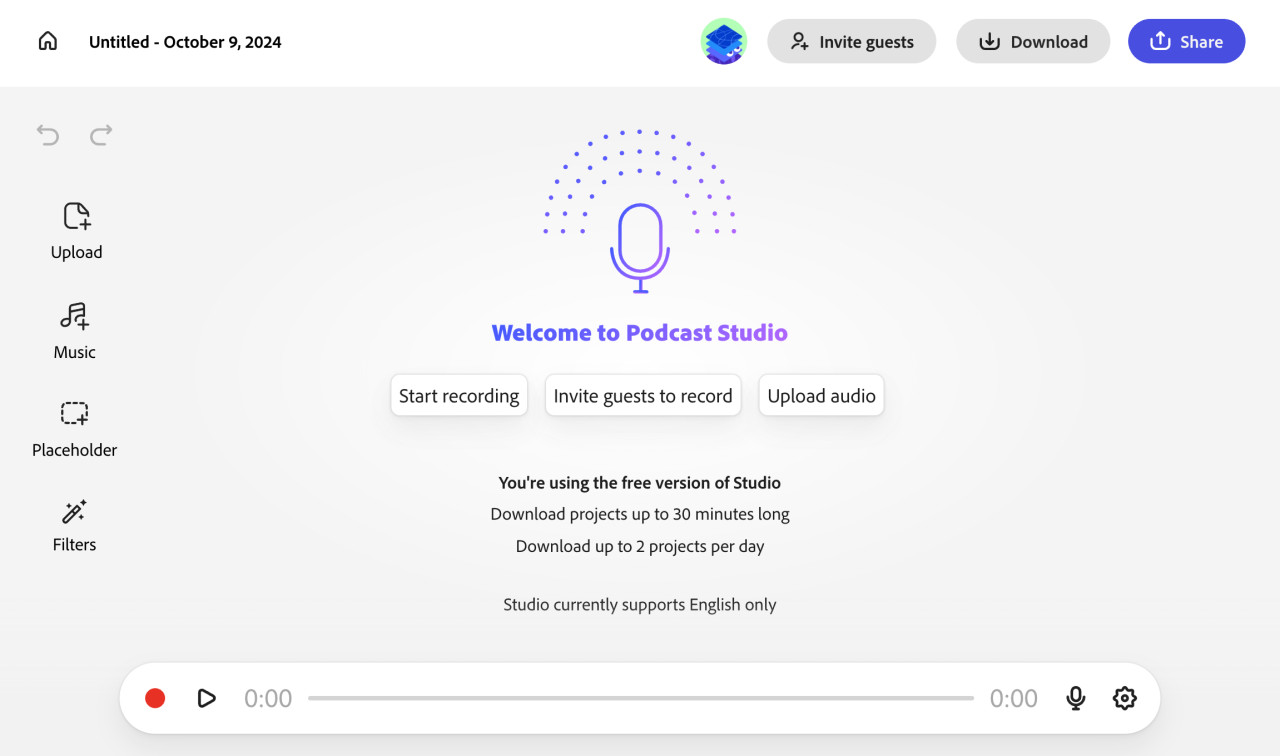
Adobe Podcast: Complete Buyer's Guide
AI-powered audio enhancement solution
Adobe Podcast positions itself as an AI-powered audio enhancement solution within the broader landscape of podcast production tools, though its capabilities reveal a fundamental misalignment with comprehensive marketing automation needs. While the tool delivers documented improvements in audio quality through noise reduction and speech clarity enhancement[127][131], it lacks the content repurposing, audience analytics, and promotional automation features that define marketing-specific podcast platforms[124][131][138].
Market Position & Maturity
Market Standing
Adobe Podcast functions as a component solution within broader marketing technology stacks rather than a comprehensive platform[124][131].
Company Maturity
Adobe Podcast operates within Adobe's established Creative Cloud ecosystem, benefiting from the company's market stability and brand recognition among creative professionals[126][136].
Longevity Assessment
Long-term viability appears secure given Adobe's market position and financial stability, though organizations should consider whether Adobe Podcast's limited functionality will create workflow bottlenecks requiring platform migration within 12-24 months as marketing sophistication grows[124][131][138].
Proof of Capabilities
Customer Evidence
Customer feedback indicates positive reception for audio enhancement simplicity, with users reporting time savings in basic audio cleanup workflows[131][138].
Quantified Outcomes
Technical performance validation includes vendor claims of up to 90% noise reduction and processing speeds measured in seconds, though these metrics represent vendor assertions rather than independently verified benchmarks[127][131].
Market Validation
Market validation remains limited to audio enhancement use cases rather than comprehensive marketing applications. Organizations achieve optimal results when positioning the tool as audio enhancement infrastructure rather than comprehensive marketing automation[124][131][138].
AI Technology
Adobe Podcast's AI architecture centers on three primary tools: Enhance Speech for automated noise and echo reduction, Mic Check for microphone optimization, and Studio for browser-based recording and editing[126][127][134]. The AI algorithms automatically distinguish speech from background noise, applying real-time adjustments to vocal clarity without requiring manual EQ tuning expertise[127][131].
Architecture
The browser-based interface eliminates software installation requirements, enabling immediate productivity for basic audio enhancement tasks[134][138].
Primary Competitors
Primary competitors include specialized marketing platforms (Goldcast, Ausha, Capsho) for comprehensive marketing automation, professional audio tools (Hindenburg Pro, Descript) for advanced editing capabilities, and freemium alternatives (Audacity) for basic audio processing[10][11][12][20][124].
Competitive Advantages
Creative Cloud integration represents a significant differentiator for marketing teams already using Adobe's ecosystem, enabling seamless audio-to-video workflows without file format conversion[120][123][126]. Processing speed and simplicity provide competitive advantages over complex editing platforms, making professional-quality results accessible without technical audio backgrounds[127][131].
Market Positioning
Adobe Podcast faces significant competitive disadvantages when compared to marketing-focused platforms in the AI podcast tools landscape. Specialized platforms like Ausha provide AI-generated show notes and social posts that reduce marketing workload by reported 60%, while Adobe Podcast offers no content generation capabilities beyond audio enhancement[10][124][131].
Win/Loss Scenarios
Win scenarios favor Adobe Podcast when organizations prioritize audio quality improvement within Adobe ecosystems, have budget constraints limiting comprehensive marketing platform investments, or require simple audio enhancement without marketing automation complexity[120][123][127][129]. Loss scenarios occur when marketing teams require integrated content repurposing, audience analytics, or promotional automation capabilities that justify higher investment in specialized platforms[10][12][20][124].
Key Features

Pros & Cons
Use Cases
Integrations
Pricing
Featured In Articles
Comprehensive analysis of AI Podcast Tools for AI Marketing & Advertising for AI Marketing & Advertising professionals. Expert evaluation of features, pricing, and implementation.
How We Researched This Guide
About This Guide: This comprehensive analysis is based on extensive competitive intelligence and real-world implementation data from leading AI vendors. StayModern updates this guide quarterly to reflect market developments and vendor performance changes.
139+ verified sources per analysis including official documentation, customer reviews, analyst reports, and industry publications.
- • Vendor documentation & whitepapers
- • Customer testimonials & case studies
- • Third-party analyst assessments
- • Industry benchmarking reports
Standardized assessment framework across 8 key dimensions for objective comparison.
- • Technology capabilities & architecture
- • Market position & customer evidence
- • Implementation experience & support
- • Pricing value & competitive position
Research is refreshed every 90 days to capture market changes and new vendor capabilities.
- • New product releases & features
- • Market positioning changes
- • Customer feedback integration
- • Competitive landscape shifts
Every claim is source-linked with direct citations to original materials for verification.
- • Clickable citation links
- • Original source attribution
- • Date stamps for currency
- • Quality score validation
Analysis follows systematic research protocols with consistent evaluation frameworks.
- • Standardized assessment criteria
- • Multi-source verification process
- • Consistent evaluation methodology
- • Quality assurance protocols
Buyer-focused analysis with transparent methodology and factual accuracy commitment.
- • Objective comparative analysis
- • Transparent research methodology
- • Factual accuracy commitment
- • Continuous quality improvement
Quality Commitment: If you find any inaccuracies in our analysis on this page, please contact us at research@staymodern.ai. We're committed to maintaining the highest standards of research integrity and will investigate and correct any issues promptly.